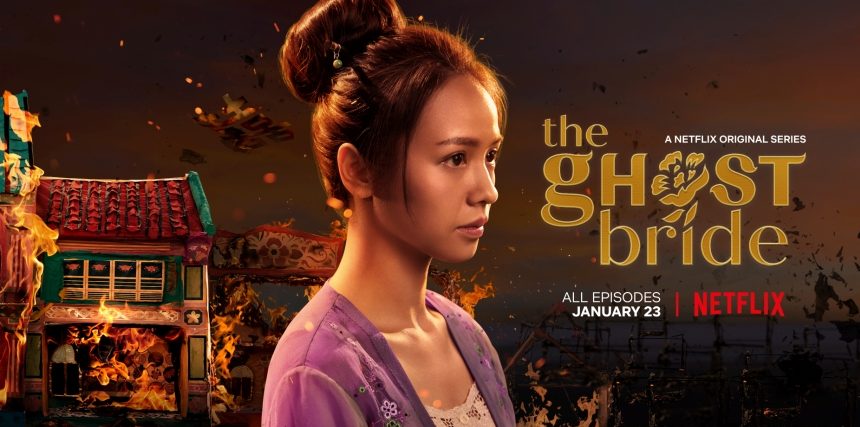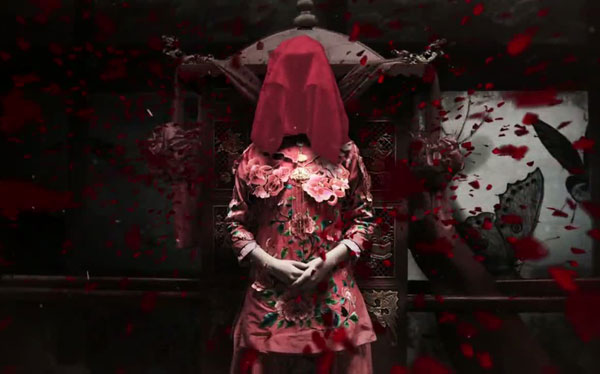 EXO's Chen Welcomes His First Child
EXO's Chen Welcomes His First Child
 |
Disclaimer: By the time this article is published, I will have this drama marked as complete – the same day as I started watching it. This is a Netflix original with all episodes being released on the same day. After watching half of the episodes, I paused my viewing, wrote this article before watching episode 4-6 and completed the drama after submitting this article. This article was written halfway through viewing as would be done with a weekly airing drama.
I do admit, this is only the second piece of Taiwanese media I have seen. The only movie I had seen at this point was The Ninth Precinct with The Ghost Bride following a month later as my first show. I will not be able to point out or discuss tropes, overused plot lines, etc., as I simply don’t know they exist.
I found The Ghost Bride when writing a different article, and the cover intrigued me. I read the synopsis and decided “this is going to be my first Taiwanese drama”. When the morning of the 23rd came, I woke up, got a coffee, settled back on my couch and binged the first three episodes in a flurry. I’ve been trying to watch more dramas recently and this short 6 episode, 50-minute piece seemed perfect – in fact, I’d only finished Kingdom two days before, and it was the perfect length for me to digest, so I wanted to really give this one a chance.
I am so glad I did.
Stats
Set in 1890, a young woman was forced to marry a dead man as a ghost bride in exchange to have her family's financial debt forgiven. Her attempt to escape the obligation was complicated by her discovery of a conspiracy that was much bigger and more mysterious than she ever thought she would be in.
Genres: Thriller, Historical, Mystery, Horror, Drama, Family, Supernatural
Country: Taiwan (cross produced with Malaysia)
Episodes: 6
Duration: 50 minutes
Average Rating: 8.1/10 from 346 users
Rating: 15+ - Teens 15 or Older
Spoken Language: Mandarin
Release Date: January 23rd 2020
All information accurate at the time of article submission,
the article was written on the same day as the release.
Cast
The main cast in this, all four of them, all do absolutely amazingly. There’s nothing much more I can say than that they are all stunning in their roles so far. All of the characters are so three dimensional. I haven’t seen any of these actors in things before, and I have to say, they have all caught me by surprise – Huang Pei Jia and Chris Wu especially.
Just within three episodes, I already want to go on and watch more from our four main leads, and I find myself intrigued and captivated.
My only qualm, really, is with Kuang Tian. His acting is quite wooden and off the mark at some points in the first few episodes; some of his solo shots feel a little awkward. With that being said The Ghost Bride is his first drama, so I’m not holding it against him completely – he has room in the future to adapt and learn, so for a first drama, I’d say he does extremely well.
The actors have brought these characters to life in such brilliant ways; I feel for them, I have cried already for Li Lan, and I truly want to binge the rest of this and see how they fare. I care for them all in different ways each and I cannot wait to finish this off and find out what happens. I really am rooting for all the characters to get what they need.
You may know Huang Pei Jia from Long Day's Journey Into Light.
You may know Chris Wu from The World Between Us.
You may know Lin Lu Di from Power Rangers.
Plot
 |
So far, I love everything about this. None of the scenes feels like filler scenes, the small twists thus far have been brilliant, and it all feels substantial. There’s a nice balance in the first half of this series of comedy, life and a tinge of horror which hints to me that in the second half, the horror genre of this is going to seriously come to life.
The comedy aspects are well rounded, genuinely quite funny, and something that has made me chuckle numerous times – not something I usually do with horror-comedy; I usually find the humour misplaced and not fitting. The Ghost Bride does it all absolutely perfect, and it’s definitely making me rethink my stance on horror-comedy.
The plotline itself is interesting. It’s dark, hints at a lot more to come, and it gives me a little chill thinking about what is going to happen as the plot furthers. It makes me a little anxious – in a good way – and I can’t wait to grab some food and binge the rest of this drama to completion.
Usually, when I watch things like this, I end up just half-watching it and trying to finish it to mark as completed and be done with it. This is not the case at all with The Ghost Bride. I want to know what happens, I want to see the ending, I’m praying that the ending holds up and everything else you could wish for a drama you’re enjoying.
The plot is truly intriguing, has captivated my attention whole and has me on edge waiting for what will happen next.
Chinese Ghost Marriage
 poster for The House that Never Dies poster for The House that Never Dies |
Before finishing this article, I wanted to take a look into the actual concept of ghost marriage, which was a tradition well seen in Chinese (Hong Kong, Taiwan, etc. also) past.
I didn’t know until looking it up that this was actually something that occurred in the past and that ghost brides weren’t actually unheard of. A man, or woman, or a deceased could and would be married in circumstances in which tradition would be upset should the marriage not occur.
If a fiancé died before a wedding, a woman had the choice to become a ghost wife and marry the spirit of her deceased betrothed. The groom was represented by a white cockerel at the wedding. However, many women were hesitant to follow this route as it meant taking a vow of celibacy, moving in with the deceased’s family, taking part in the funeral ritual and mourning customs – which including strict dress and conduct standards. A groom also had the option of marrying his dead fiancé, but without rules such as this – there have been no records of a man marrying his deceased to-be wife.
In the past, an unmarried daughter could become a source of embarrassment. This could be down to social status, wealth status, etc. – in some cases, no one would marry the daughter because her family were not worthy enough, or the family could not afford a wedding in any form.
Charlotte Ikels, in the “Parental Perspective on the Significance of Marriage” states:
Traditionally, girls who did not marry were regarded as a threat to the entire family and were not allowed to continue living at home. Even in contemporary Hong Kong, I was told that unmarried women are assumed to have psychological problems. Presumably no normal person would remain unmarried voluntarily.
Women could choose to have a "bride-initiated spirit marriage" which was a successful way to avoid being married. This allowed them to stay single but still be integrated into another lineage. However, many people would call out the "fake spirit marriage", and it was often called "marrying a spirit table".
If a son died before he was married, his parents could arrange a ghost marriage to provide offspring to continue their familial line and give him children.
A man in China does not marry so much for his own benefit as for that of the family: to continue the family name; to provide descendants to keep up the ancestral worship; and to give a daughter-in-law to his mother to wait on her and be, in general, a daughter to her.
Sometimes, a live woman would be taken as a wife, but this was rare. The ceremony itself would take on characteristics of both a marriage and a funeral. The spirit of the deceased would be led by a medium or priest while her body was transferred to lay next to the grave of her husband.
If a family was wealthy enough for a living woman to marry their son, the ghost marriage may profit them with a daughter-in-law, who would act as a caregiver in the home.
Since a daughter is not considered "a potential contributor to the lineage into which she is born" but rather "it is expected that she will give the children she bears and her adult labour to the family of her husband."
Once the deceased son was married, the family could adopt an heir into their family to continue the family line. It was not the daughter-in-law's job to provide children as she was to live a chaste life, but she would be a "social instrument" that allowed the adoption to happen.
The family preferred to adopt patrilineally related male kin, usually through a brother assigning one of his own sons to the lineage of the deceased. The adoption was carried out by writing up a contract, which was then placed under the dead man's tablet. As an adopted son, his duties were to make ancestral offerings on his birth and death dates, and he was additionally "entitled to inherit his foster father's share of the family estate."
As an elder brother would often die before his younger brothers and before his marriage, the family would often marry their eldest son in a ghost marriage before his younger brothers were married. This was to ensure that the eldest brother would not view the family in disfavour and cause problems for the marriage of his brothers or cause problems to the family.
It was believed that a son could also have disfavour with his family when he reached the afterlife to find he did not have a spouse with him.
"This usually takes the form of sickness by one or more family members. When the sickness is not cured by ordinary means, the family turns to divination and learns of the plight of the ghost through a séance."
This disfavour would usually occur with his natal family, the family of the betrothed or the would-be wife's sisters. The deceased may also appear in a dream to one of his family members and simply ask for a wife to be given to him.
Source
So that's an inside look into The Ghost Bride Are you currently watching this? Do you want to give it a go? What are your thoughts on the drama? What do you think of the historical background of ghost brides? Thanks for reading! |















